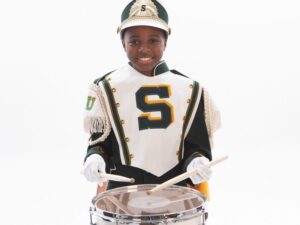
All About the Arts
Which one is yours?”
“The one in the yellow butterfly costume on the far left.”
“Awe, she’s such a doll. You can tell by her big smile that she is truly enjoying herself.”
“That smile hasn’t left her face since she started. Performing arts has really helped her transform into a happy, confident social butterfly.”
Nothing is more special than witnessing your child shine from the inside out while doing something she absolutely loves, whether it’s dancing, singing, performing on stage, or playing an instrument. Sometimes figuring out what exactly will start the initial spark is as difficult as finding a lost sock. Isn’t life about exploring and learning, though?
Let your children explore their creative side and try out the performing arts. They will not only have the chance to make new memories and friends, but they also gain valuable skills that will stay with them for years to come, both on and off the stage.
ACADEMIC ACHIEVEMENT AND HEALTHIER LIFESTYLE
Adding performing arts to your child’s schedule would not affect her academic performance negatively. She will actually become more focused and motivated.
According to the American Alliance for Theatre & Education, students who take part in performing arts have higher rates of school attendance, better SAT scores, and better reading comprehension. Drama students use the same reading comprehension skills they are learning in the classroom when they’re memorizing a script.
Christine Perkins of the Baton Rouge Ballet Theatre says, “Children who study dance are more organized and strong students. They are always improving their memory skills and math scores.” Children learning to read music and understand music theory are also tipping into their mathematical skills.
The performing arts also help children stay active and healthy. Perkins states the immediate benefits of studying dance are better body control and muscle strength. She says, “Dancers develop strong bodies that are graceful, coordinated, and flexible. Dancers, overall, are mentally and physically tough!”
COMMUNICATION
Children who participate in various grouped activities regularly become better listeners and communicators. They will learn to be a team player and communicate with others effectively.
Drama classes help kids succeed in public-speaking, reading body language, and adjusting tone accordingly. Music and dance classes give kids the chance to understand and read non-verbal cues well. Children who become advanced listeners are most likely to develop cultural leadership skills in the future.
EMOTIONAL INTELLIGENCE
Your child will not only learn to control her own emotions better, but she will also learn to understand the emotions of others. Performing arts allow individuals to explore their emotions freely. If your child struggles with releasing emotions, channeling her emotions through the art of performing will boost her mood and confidence.
She will also learn how to empathize with other people and respect important differences, especially when she is portraying a character dramatically different from herself. Learning about different communities, countries, and cultures through art allows your child to become a well-rounded person and citizen.
DISCIPLINE AND RESILIENCE
Performing takes a lot of practice and commitment. For instance, children learning how to play an instrument practice routinely to make progress. The reward is satisfying, and it also teaches them why commitment is so important.
Rehearsal also supports optimistic work habits. Performing on stage provides students the opportunity to work out their fears of embarrassment and mistakes. The arts teach students not to put too much thought into errors and focus on growth. This skill is handy for children looking to become motivational speakers, entrepreneurs, or architects.
EXPLORATION IS KEY
Supporting a lifelong interest in the arts at any level can be both fulfilling and stressful. Exploration is key to nurturing a lifelong love of the arts. Take note of your child’s particular interests and ways of learning before searching.
You will have a better chance at matching her up with the right teachers and topics. Also, look for classes with a variety of opportunities for self-expression and fun. Some classes might be too intense for a child who just wants to try something out. Observe a few classes to see if the kids are actually enjoying the process.
To be or not to be looking into school-based programs is the real question. Theatre director and educator Fabiola Espinosa Reno encourages parents to ask about performing arts programs within their public and private schools to test the waters first. She adds, “Another option is to enroll the student in a summer camp or local after-school performing arts center.”
Charlotte Reynolds, mother and Spotlight Theater Players Board Director, says, “Parents should seek any opportunity they can find for their children at school as well as at home.” There are also many ways for kids to explore within the context of the arts at home. Play improvisational games and dress up in costumes. Encourage your children to stage homespun plays and short productions at family gatherings.
Get musical together or have dance parties. Buy cheap instruments or use iPads/electronic apps. GarageBand, which comes with all Macs, allows kids to experiment with mixing music and composing their own pieces. You can also give your kids paper and crayons or pencil to draw or write what they imagine as they hear the notes.
After-school programs and performing arts schools are also beneficial. Perkins believes, “Performing arts schools are the best place for actual training in the arts to ensure that your child is learning actual technique and skills correctly.” Local mother Dee Odom has incorporated arts outside of the school day to ensure her daughter is well-rounded academically. She says, “She loves doing the kids acting workshops held at Upstage Theater.”
Don’t worry if your child switches instruments or pursues new types of activities. Interests evolve and change over time, and that’s okay. Just set out clear expectations about commitments. Don’t lock them into one activity unless there is actual interest and dedication on their part. Always remember the importance of intrinsic motivation stoked by curiosity and the full range of creative thinking, including self-expression.





